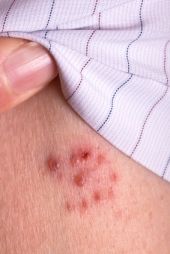 Zithromax is a type of drug with the generic name azithromycin, also commonly referred to as Zmax or Z-pak. It belongs to a family of medications called the macrolide antibiotics.
Zithromax is a type of drug with the generic name azithromycin, also commonly referred to as Zmax or Z-pak. It belongs to a family of medications called the macrolide antibiotics.
Zithromax Z-pak is used to treat mild to moderate infections in the upper and lower respiratory tract (bronchitis, pneumonia), nasal throat and nasal passages (laryngitis, sinusitis, tonsillitis), ears (otitis media), and skin. It is also used to treat cervicitis, urethritis, and Chlamydia, a sexually transmitted infection.
Zithromax stops infections by killing bacteria and preventing its further growth. Zithromax does this by disabling bacteria from creating essential proteins. Without these essential proteins, bacteria can’t grow and multiply.
However, while incredibly effective, Zithromax, like most antibiotics, have side effects.
What Are The Side Effects of Zithromax?
Among the most common side effects of Zithromax are loose stools or diarrhea, vomiting, abdominal pain, and nausea. Other less severe side effects may also include loss of appetite, vaginal itching, skin rash, stomach cramps, and head pain.
However, there have been reports of severe allergic reactions to Zithromax, including Stevens Johnson Syndrome, which is a type of cutaneous reaction that affects the skin and mucous membranes.
Zithromax SJS
Stevens Johnson Syndrome (SJS) is the severe adverse reaction of skin and mucous membranes to an infection or medication like Zithromax Z-pak. SJS symptoms include a painful red or purplish rash that can spread and blister, eventually causing the top layer of skin to die and shed.
Initially, patients suffering from SJS often present with general symptoms like fever, aching and nausea. From there, there may be many possible complications, along with varying symptoms. First, the SJS skin reaction can lead to a life-threatening complication, like meningitis and sepsis, as the exposed skin is more susceptible to infection.
Meningitis is an infection of the membrane and fluid surrounding the brain and spinal cord. Sepsis is an inflammatory infection of the whole body. This can occur when bacteria from a major infection enters the bloodstream and spreads throughout the body. It is a life-threatening infection because it can cause shock and organ failure.
If you are diagnosed with SJS, you may experience eye problems, damage to internal organs and/or permanent skin damage. If more than 30 percent of a patient’s body is affected by the SJS rash, the disease has then progressed to Toxic Epidermal Necrolysis (TEN), which has a higher risk of injury and death.
There is no cure for SJS or TEN. Treatment for SJS/TEN often involves hospitalization in burn centers or debridement (surgical removal of damaged tissue). Individuals with SJS/TEN can take weeks or even months to recover depending upon the severity of the condition.
It is highly recommended that if you have, or are suspected of having an allergic reaction to Zithromax that resemble the above symptoms, that you seek immediate medical attention.
SJS Lawsuits
SJS and TEN have been linked to a number of drugs, including an allergic reaction to Zithromax. If you or a loved one experienced drug-induced SJS/TEN, you may have a defective product claim against a pharmaceutical company who failed to warn you and your doctor about the harmful side effects.
Do YOU have a legal claim? Fill out the form on this page now for a free, immediate, and confidential case evaluation. The Stevens Johnson Syndrome attorneys who work with Top Class Actions will contact you if you qualify to let you know if an individual lawsuit or class action lawsuit is best for you. [In general, SJS lawsuits are filed individually by each plaintiff and are not class actions.] Hurry — statutes of limitations may apply.
ATTORNEY ADVERTISING
Top Class Actions is a Proud Member of the American Bar Association
LEGAL INFORMATION IS NOT LEGAL ADVICE
Top Class Actions Legal Statement
©2008 – 2026 Top Class Actions® LLC
Various Trademarks held by their respective owners
This website is not intended for viewing or usage by European Union citizens.
Get Help – It’s Free
Help for Victims of Stevens Johnson Syndrome
If you or a loved one were diagnosed with Stevens Johnson Syndrome (SJS) or toxic epidermal necrolysis (TEN) after taking a prescribed or over-the-counter medication, you may be eligible to take legal action against the drug’s manufacturer. Filing an SJS lawsuit or class action lawsuit may help you obtain compensation for medical bills, pain and suffering, and other damages. Obtain a free and confidential review of your case by filling out the form below.
An attorney will contact you if you qualify to discuss the details of your potential case at no charge to you.
Oops! We could not locate your form.












